33 teams applied for the 12 spots in the Olympics, with 9 of those places already being guaranteed to the nations ranked 1-8 in the IIHF World Rankings following the 2015 World Championships back in May of 2015 plus, somewhat controversially, the host nation South Korea, who are currently 23rd in the World Rankings.
After some debate, the IIHF granted the hosts a guaranteed place in the tournament in a two-pronged effort to use the South Korean participation in the Olympics as a catalyst to improve their hockey program as well as sell a few more tickets to the games involving the home team.
Surprisingly enough, the Olympic Preliminary Qualification phase, for the Olympics to be held in February 2018, began back in October of 2015 with a playoff game to determine which nation would join the full four team Group K. In that playoff game, the hosts Bulgaria defeated the nation of Georgia 9-1 to advance to Group K play, which took place in early November, 2015.
Host Estonia (currently ranked 29th), Mexico (32nd), Israel (33rd) and Bulgaria (39th) participated in a round robin schedule to determine which of the four teams would advance to play in Group H in the Olympic Preliminary Round 1 phase.
Estonia demolished the competition with a 19-1 win over Israel, a 26-0 blowout of Bulgaria and secured their place in the next round with a decisive 13-3 win over Mexico to make their final total 58 goals for and 4 against.
Meanwhile, Group L of the Preliminary Round 1 stage took place in Spain and consisted of Serbia (30th), Spain (31st), Iceland (35th) and China (38th). Serbia needed a shootout to beat Iceland 5-4 in their first game, while Spain beat China 10-1 to take an early lead in the standings. Spain maintained it's one point advantage when they defeated Iceland 5-3 after Serbia beat China 5-1, setting up the final decisive contest. Serbia prevailed with a 5-3 over the Spaniards to win the Group 8 points to 6 and advance to the Preliminary Round 2 Group G.
Marko Milovanovic does it all for Serbia, having scored the game winning goal against Spain with 2:34 left in a 3-3 game as well as not only serving as the Serbian team captain, but his also the president of the Serbian Ice Hockey Federation as well!
The Olympic Preliminary Round 2 games took place in February of 2016, beginning with Group G in Italy. There, Italy (18th), Great Britain (24th), the Netherlands (25th) and Group L winners Serbia (30th) faced off, with Great Britain narrowly defeating the Netherlands 6-5 in the opening game. Italy took full advantage of their higher ranking and home ice to shut out Serbia 8-0. Great Britain then beat Serbia 6-2 while Italy outlasted a game Netherlands 4-2 to set up the deciding game Sunday between the British and the Italians. Italy demoralized their opponents with a 3-0 lead after the first period and cruised home to a 6-2 win to take the group and advance to the next round.
Group J in Sapporo, Japan, site of the 1972 Winter Olympics, consisted of Japan (20th), Ukraine (21st), Croatia (27th) and Romania (28th). Ukraine and Japan posted matching 3-0 wins on day one over Romania and Croatia. They again both shutout their competition on the second day, Ukraine 6-0 over Croatia and Japan 7-0 over Romania, to set up their winner-take-all showdown. In a real nail-biter, the game entered the third period scoreless before Japan broke out on top with a goal at 6:19 of the third. They then extended their lead to 2-0 at 10:32 only to have Ukraine pull one back at 14:36, leaving Japan to defend their one goal advantage for the remaining 5 1/2 minutes. Former NHLer Yutaka Fukufuji was up to the task and finished with 32 saves to send Japan on to the next round.
Finally, Group H in Hungary (19th) saw them host Poland (22nd), Lithuania (26th) and dominant Group K winners Estonia (29th). While the teams to advance are usually no match for those awaiting them in the higher ranked groups of the next round, Estonia's utter dominance gave one hope that they would at least be competitive in Group H.
Poland started strong with a 6-2 win over Estonia, while Hungary matched that with a 4-0 defeat of Lithuania on the first day. Both Poland and Hungary won big the next day with the Poles romping to a 9-1 win over Lithuania, while Hungary downed Estonia 7-1 to once more set up a decisive game between the group's two highest ranked teams.
But first, Estonia showed they were not in over their heads by easily defeating Lithuania 4-1, becoming the first advancing team in the 2018 Olympic Qualification process to win a game.
The main event between Hungary and Poland saw the Hungarians outshoot Poland 11-4 in the first period and 13-10 in the second, but the second period ended scoreless. Hungary again had the advantage in shots in the third period 10-9, but regulation ended with no score, as did the overtime, which had Hungary once more with a 4-3 advantage in shots, but they were unable to solve Przemyslaw Odrobny in goal for Poland who made 38 saves versus 26 for his Hungarian counterpart Miklos Rajna.
The game and promotion to the Final Qualification round came down to a shootout. Odrobny saved the first Hungarian shot before Krzysztof Zapala scored for Poland. Both goalies traded saves in round two and when Frank Banham beat Odrobny but hit the pipe with Hungary's do-or-die third shot, Poland had scored the upset victory to win the group and advance, becoming the only team that was not a top seed to move on.
Finally, Group F will take place in Norway (11) with France (12), Kazakhstan (17) and Italy (18) in what is easily "The Group of Death", as the host team in grouped with not only the team ranked directly behind them in the standings, but the highest ranked fourth seed of the three groups.
The final Olympic group, Group A, is already set, with Canada (1), the Czech Republic (6), Switzerland (7) and host South Korea (23), who the organizers already know will be the lowest seeded of the 12 Olympic participants.
The most memorable game in Olympic qualification history took place in January of 2005 to decide who would advance to Torino, Italy in 2006. Group B held in Riga, Latvia saw Belarus gain two points in the standings by defeating Poland, while Latvia knocked off Slovenia 2-1. Belarus took care of Slovenia the next day 7-2 while Latvia kept pace by beating Poland 3-1, setting up the final winner-take-all game against Belarus.
Today's featured jersey is a 2014 Slovenia National Team Anze Kopitar jersey as worn during the 2014 Olympics in Sochi, Russia. Slovenia had never qualified for the Olympics prior to 2014 and were not guaranteed a spot based on their world rankings. They were placed in Group F in the Olympic Qualifying process and won their group over Belarus, Denmark and Ukraine. Slovenia were ranked 17th in the world and it was a shock that they advanced to the Olympics despite being ranked lower than eventual non-qualifiers Germany (10th), Denmark (12), France (13), Belarus (14) and Kazakhstan (16). In Group F, they opened with a 4-2 win over Belarus before a key 2-1 win over hosts Denmark. They then dominated Ukraine 6-1 to secure their stunning, unexpected place in the Sochi Olympics.
Up until the 2014 Olympic Games, Slovenia wore blue jerseys trimmed in red in the colors of the Slovenian flag. Their national football club had begun wearing green kits as far back as 1994, which are the traditional colors of the capital city of Ljubljana, which has a green dragon perched on a white castle atop green hills on its coat of arms, which is placed on a half white, half green field for the city flag.
Additionally, those colors were used by NK Olimpija, the most successful club team at the time, which is based in Ljubljana.
The national hockey team continued to wear blue jerseys accented with red and white through the 2013 World Championships before debuting their new blue and green jerseys for the 2014 Olympics, which caused quite a stir, as the shade of green was a very modern electric shade of green and nothing like the traditional primary colors that essentially every other nation uses.
As a former member of Yugoslavia, which endured a horrible war in the aftermath of the breakup of the former communist nation, perhaps some of the motivation for Slovenia originally changing the national soccer team colors was to differentiate themselves from other former Yugoslavian members Croatia and particularly Serbia, who also wear red, white and blue colors.


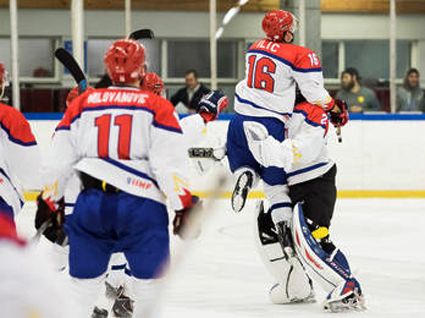
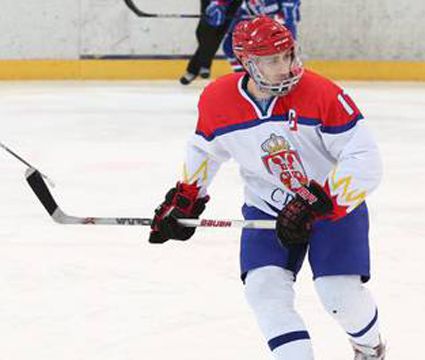
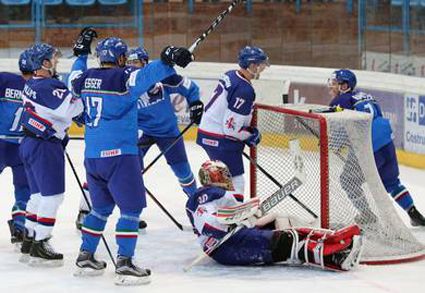
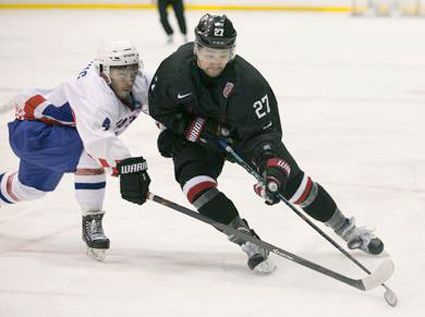
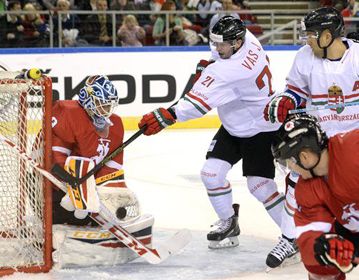
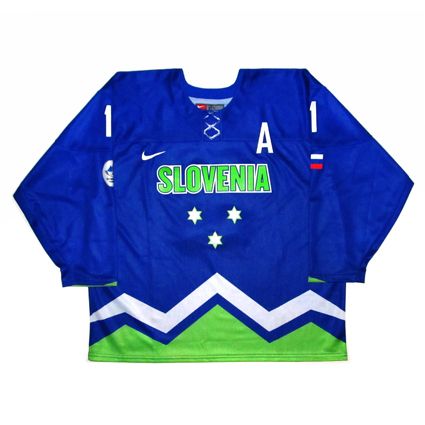
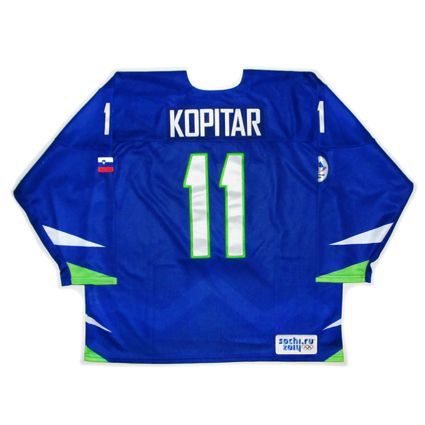










No comments:
Post a Comment
We welcome and encourage genuine comments and corrections from our readers. Please no spam. It will not be approved and never seen.